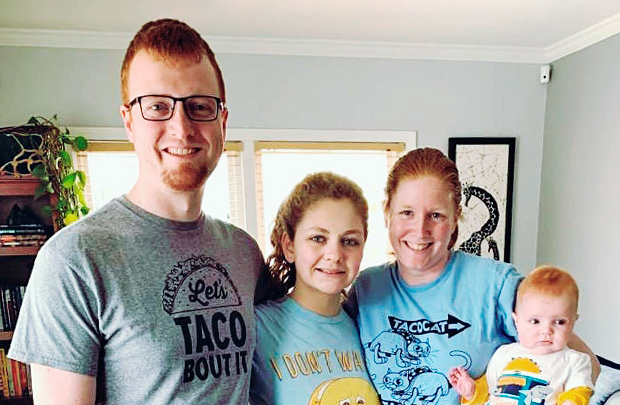
Susan Drucker is a social worker in Minnesota. Two years ago, she and her husband decided to adopt a teen. We talked with Susan about her family and how her work influenced her adoption experience.
What made you decide to adopt a teen from foster care?
My husband, Brandon, and I thought we’d have birth kids and then adopt. But we were 30 and still childless, so the plan changed. We were committed to adopting a teen, because in my work, I see that teens are often overlooked.
We got licensed through an agency that specifically works with teens and matched with our daughter soon after.
What did that matching process look like?
Our daughter was 13 years old and legally free to be adopted when we saw her profile. We inquired, and once we were approved as a possible match, we met with her therapists, staff at the residential treatment facility where she lived previously, current teachers, former teachers, and current foster parents. It was very thorough!
We met with everyone in her life, but we couldn’t meet with her until her team concluded that we were an official match. This was to ensure that her heart was protected and she didn’t know that there was a family in the works in case it didn’t pan out.
As you were learning about your future daughter, was she learning about you?
She learned about us after were approved to adopt her. At that point, her worker set up a transition plan that detailed how they would tell her that we wanted to adopt her and gave her a calendar so she knew what could be coming. We made a life book about our family, which her worker gave to her.
Once our daughter had all of this information and had learned about us, they asked her if she wanted to meet us. And she said yes. We followed the transition plan, and she moved into our home in November 2018. We finalized her adoption nine months later, in August 2019.
Your work is licensing foster homes for the county. How did that inform your approach to adoption?
Because I work in the foster care system, I am aware of what these kids have been through and what the effects of trauma can be. So our matching process went smoothly because I knew what sort of behaviors and conditions we could and couldn’t handle.
Also, I’ve seen how important birth-family relationships can be to kids. So I hoped that we would adopt a child whose birth family was still involved in their lives.
On the other hand, even though I’ve read a lot of children’s files, reading them thinking that these things happened to a child that could be mine—a child I could love and commit to raising—was much harder than I’d expected. And it was really hard for my husband, who was new to all of this.
You mentioned wanting to maintain a child’s birth family connections. Why is that important—and what does it look like for your family?
It’s important because it gives children a connection to their past. Our daughter is fortunate to have birth family—grandparents and a brother—just a few hours away. She spends one weekend a month with her paternal grandparents and brother, and visits with her maternal grandfather regularly.
Last year, we went to a family Christmas party and met aunts and uncles. I imagine we’ll continue that tradition.
We recently had a birth child and this has brought up many questions about our daughter’s early childhood. It has been very important to her to obtain pictures and information from people who knew her when she was younger. Without these relatives in her life, she wouldn’t be able to ask anyone about her birth family.
What has the last year been like for your family?
Adopting a teen really rocks your world—in wonderful and unexpected ways. We’ve been challenged. We’ve made mistakes. And we’ve definitely learned that we are not perfect.
We’ve had the privilege of seeing life through our daughter’s eyes and watching her grow in so many ways—academically, socially. She’s gone from never doing sports to being on a synchronized swimming and equestrian vaulting team. And from being a girl who was afraid to leave our side to a typical teen, seeking her independence.
What is your advice to people who are thinking about adopting a teen?
Go in with an open mind. Don’t think you’re adopting a best friend or expect the child to be grateful to get to live in your house. Were you grateful to your parents when you were that age? No child should ever have to think that way.
Connect with other families who’ve adopted. I go to an in-person support group and really value the interactions, but there are also online groups.
And remember: There will be good days, and there will be bad days. But the good ones will far outweigh the bad.
Read more about adopting teens, including why teens need families and the post-adoption support available to parents and teens.